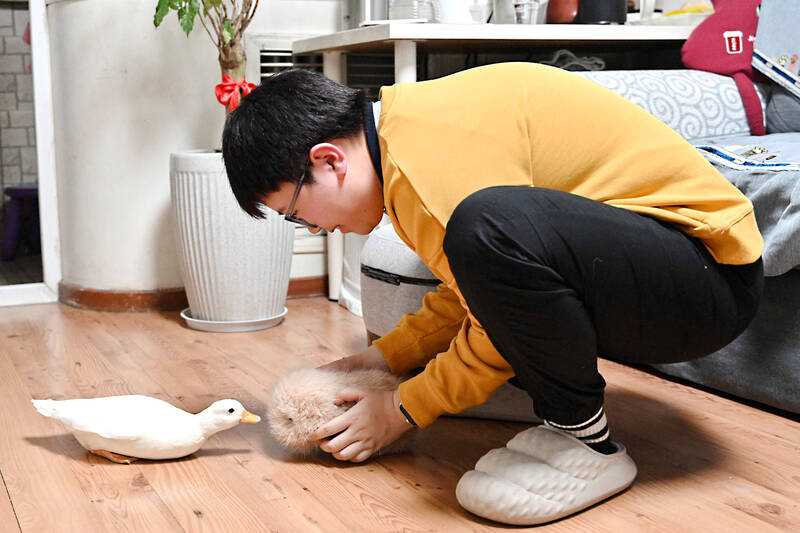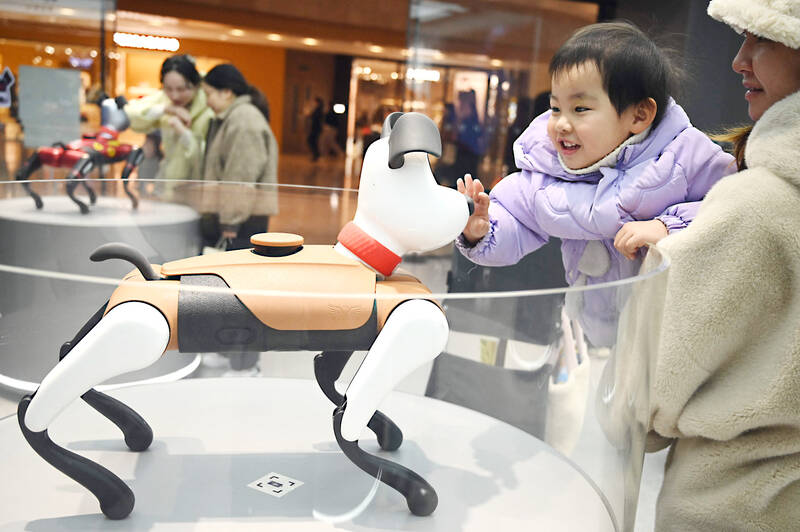At a shopping mall in Beijing, Zhang Yachun murmurs quietly to her closest confidant, a fluffy AI-powered robot whose soothing chirps remind her that she is not alone.
Zhang, 19, has long battled anxiety over school and work, and has struggled to form deep friendships with other people.
But since buying a BooBoo, a “smart pet” that uses artificial intelligence to interact with humans, she says life has become easier.

Photo: AFP
“I feel like I now have someone to share the happy times with,” Zhang said in the apartment she shares with her parents and a real pet duck.
Across China, a growing number of people are turning to AI to combat social isolation as the technology becomes more mature and widely accepted.
Wriggly, furry and resembling a guinea pig, BooBoo is produced by Hangzhou Genmoor Technology and retails for up to 1,400 yuan (US$190).

Photo: AFP
Developed with children’s social needs in mind, it has sold about 1,000 units since May, according to the company’s product manager Adam Duan.
On an outing this month, Zhang ferried her companion, which she named “Aluo” in a cross-body carrier, whispering to the football-sized creature as it nodded and squeaked.
At a pet shop, she pressed the beige bundle up against the window to admire a ginger cat before buying Aluo a tiny winter coat designed for a dog.
She said the robot plays the same role as human friends, adding: “[It] makes you feel you are someone who is needed.”
ROBOT BOOM
The global market for “social robots” like BooBoo is expected to grow by a factor of seven to US$42.5 billion by 2033, according to consulting firm IMARC Group, with Asia already dominating the sector.
For Guo Zichen, 33, a smart pet could help when he is unable to play with his child.
“Right now, family members are spending less time with the children,” Guo said as he examined a robotic dog on sale at the flagship store of tech company Weilan in the eastern city of Nanjing.
“Buying one for my kid can help them with studying and other things,” he mused.
Weilan’s AI dog, called “BabyAlpha”, sells for between 8,000 (US$1,090) and 26,000 yuan (US$3,500), and the company says 70 percent of buyers are families with young children.
But Guo said he was skeptical the electronic pup could bring as much joy as an actual canine.
“The biggest difference is that dogs have souls, while [BabyAlpha] looks different in an indescribable way,” he said.
“On the whole, you feel like it’s not the same as the real thing.”
SHIFTING SOCIETY
While the 1990s introduced electronic pets to the world like Japan’s digital Tamagotchis and American-made Furbies that could mimic speech, computerized companions are becoming more functional with AI.
A growing number of AI products in China cater to people’s emotional needs, from conversational chatbots to lifelike avatars of the deceased.
Social shifts like the impact of the government’s decades-long one-child policy are helping drive market growth, according to experts.
People born in the policy’s early years are now in their 40s and facing an economy burdened with soaring home prices, higher living costs and increased work stress, stretching their ability to focus on their own children.
That, in turn, “leaves little room for personal interactions, prompting people to seek alternative ways to meet their emotional needs,” said Wu Haiyan, a professor specializing in AI and psychology at the University of Macau.
AI companions provide cognitive stimulation, “enhancing the well-being of ... individuals who may otherwise feel isolated,” Wu said.
In some cases, she added, people show more trust in AI than humans.
SAME ON THE INSIDE
Zhang’s father Peng said he understood his daughter’s bond with Aluo.
“When we were young, we didn’t lack friends. We had loads as soon as we stepped out of the door,” the 51-year-old said.
“Now, children in cities seem to be under a lot more pressure, so they may lack friends.”
Zhang, an only child, said she has become more willing to share her worries with her parents since she bought Aluo.
Opening up about her troubles at school has meant that “there aren’t as many things piled up in my heart,” she said.
People of her generation often struggle to communicate face to face, Zhang said, adding that “they might be afraid” to express who they are.
“But what they feel inside has not changed,” she added, cradling Aluo in her lap.

In the March 9 edition of the Taipei Times a piece by Ninon Godefroy ran with the headine “The quiet, gentle rhythm of Taiwan.” It started with the line “Taiwan is a small, humble place. There is no Eiffel Tower, no pyramids — no singular attraction that draws the world’s attention.” I laughed out loud at that. This was out of no disrespect for the author or the piece, which made some interesting analogies and good points about how both Din Tai Fung’s and Taiwan Semiconductor Manufacturing Co’s (TSMC, 台積電) meticulous attention to detail and quality are not quite up to

April 21 to April 27 Hsieh Er’s (謝娥) political fortunes were rising fast after she got out of jail and joined the Chinese Nationalist Party (KMT) in December 1945. Not only did she hold key positions in various committees, she was elected the only woman on the Taipei City Council and headed to Nanjing in 1946 as the sole Taiwanese female representative to the National Constituent Assembly. With the support of first lady Soong May-ling (宋美齡), she started the Taipei Women’s Association and Taiwan Provincial Women’s Association, where she

Chinese Nationalist Party (KMT) Chairman Eric Chu (朱立倫) hatched a bold plan to charge forward and seize the initiative when he held a protest in front of the Taipei City Prosecutors’ Office. Though risky, because illegal, its success would help tackle at least six problems facing both himself and the KMT. What he did not see coming was Taipei Mayor Chiang Wan-an (將萬安) tripping him up out of the gate. In spite of Chu being the most consequential and successful KMT chairman since the early 2010s — arguably saving the party from financial ruin and restoring its electoral viability —

It is one of the more remarkable facts of Taiwan history that it was never occupied or claimed by any of the numerous kingdoms of southern China — Han or otherwise — that lay just across the water from it. None of their brilliant ministers ever discovered that Taiwan was a “core interest” of the state whose annexation was “inevitable.” As Paul Kua notes in an excellent monograph laying out how the Portuguese gave Taiwan the name “Formosa,” the first Europeans to express an interest in occupying Taiwan were the Spanish. Tonio Andrade in his seminal work, How Taiwan Became Chinese,